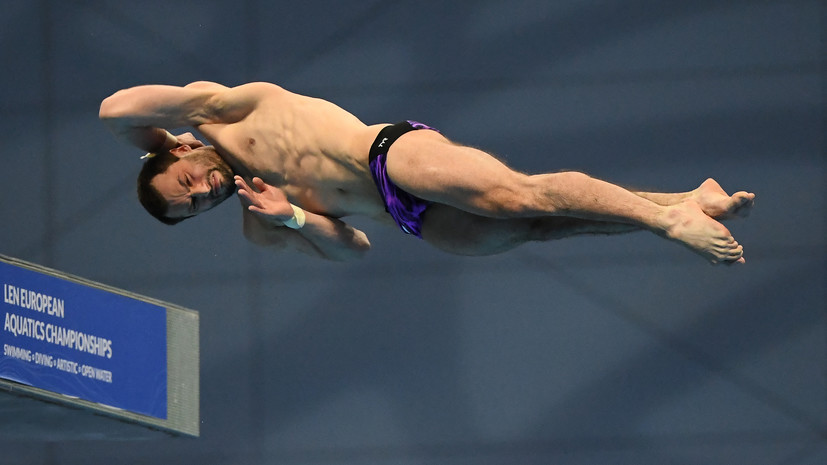For divers, the current European Championship, even before it began, was seen as an event that just needs to be experienced. After the Japanese organizing committee of the World Cup qualifying for the Olympics first canceled these competitions, and then postponed them from April to early May, it became clear that all Europeans who fly to Tokyo, and after one competition immediately go to Budapest, will face the most severe acclimatization. When athletes are in this condition, coaches rarely plan medals: the primary goal is to protect the wards from unnecessary stress and injury - especially when it comes to the Olympic season.
Perhaps it was just acclimatization that caused the failure of the leader of the English team, Olympic champion and world champion Jack Lo: in individual ski jumping, the athlete remained sixth and repeated this result in sync with Daniel Goodfellow.
In the Olympic season, the importance of the Olympic disciplines sharply increases, therefore the gold and silver medals on the men's springboard, which were won by Evgeny Kuznetsov and Nikita Schleikher, and the gold on the women's platform, won by Anna Konanykhina, delight especially strongly: it is always pleasant to come to the main start in rank the reigning champion of the continent.
The "silver" performance of Kuznetsov and Schleicher in synchronized diving on a three-meter springboard reminded the story of almost 30 years ago, which took place at the 1992 Games in Barcelona. Irina Lashko, who played for Russia in those years, had a great chance to win as never before, but she remained second. Then everyone was crying: Irina herself, the coaches, the audience, who supported the legendary Russian athlete, and the audience, who were rooting against the Chinese woman. In a word, in terms of the level of drama, the women's final on the springboard broke all records. And on the way out of the pool, a Spanish boy-volunteer approached a group of Russian journalists and said: "You are a great nation if you are capable of getting so upset about the Olympic silver medal ..."
The ability to get upset about silver when completely real gold looms in front of you has not gone anywhere since then. It is believed that competing in this discipline is somewhat easier than in individual ones: there are six attempts at synchronized players, but only four free jumps. That is, you can choose the most confident and stable combinations, which, in fact, everyone is doing. And yet they still lose to the Chinese.
The statistics are also terrifying in this regard: at the last five Olympics (synchronized jumping was included in the program of games in 2000), the Chinese won synchronized disciplines seven times out of ten. At the same time, they lost twice on the springboard. In 2004 in Athens and in 2016 in Rio, where the English duo Jack Lo - Chris Mirz won. And this "fresh" victory strongly fueled the rest (including the Russians) the desire to do the same in Tokyo. But for a start it would be good to win the continental championship in sync.
This goal in Budapest did not yield to the Russians: Kuznetsov and Schleicher lost to the Germans, Patrick Hausding and Lars Rudiger, and Alexander Bondar - Viktor Minibaev remained behind the English duo of high-tech players Thomas Daly - Matthew Lee.
As a result, the difference was a little more than five points, which is a mere trifle for jumping into the water, so the fans still have some sediment from unrealized hope.
On the final day, I really wanted a beautiful final chord.
The 10-meter platform for men is considered the most difficult and beautiful type of jumping program, and this is perhaps the only discipline in which even a score of 9-9.5 points is often not enough to win: “tens” are needed.
The championship in Budapest was no exception in this regard: in the first series, two-time world champion Daly and a young Ukrainian athlete Alexei Sereda earned three highest marks each.
Then Bondar got three “tens” in the second jump.
In the first four rounds, Alexander produced a result that could be envied in China: for each of his jumps (with the most difficult program), the ex-Ukrainian jumper earned on average more than ninety points.
In the fifth attempt, Bondar almost surpassed the grandmaster milestone of 100 points: he received 99.90 and actually secured the title of champion.
One lap before the end of the tournament, Alexander was 16.65 ahead of Daly and 28.90 ahead of Minibayev.
But the Englishman became the record holder of the penultimate round: for the same jump that Cooper had (4.5 turns forward), he received four highest marks and 109.15 in total.
As it turned out, such an incredible fuse of the two-time world champion was enough for just one attempt: the final round was again with Cooper. Minibaev also became a bronze medalist.

